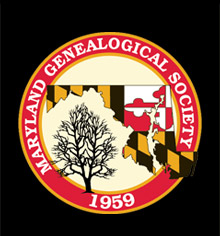
|
Welcome!
Since 1959, the Maryland Genealogical Society has been promoting genealogical study and research. Through our publications, programs, resources, and outreach, the Society can help you explore your family history.
And we hope that you'll follow us on Facebook for timely news and information.
MGS-MPT Webinar “Finding the Last Enslaver”
SAVE THE DATE - February 5, 7:00-9:00pm ET - Registration will open soon!
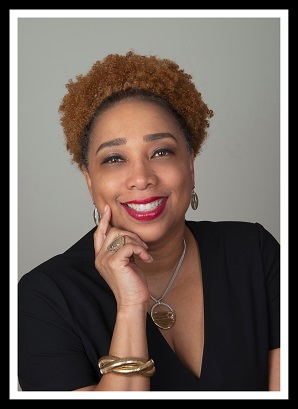 In celebration of Black History Month, the Maryland Genealogical Society is partnering with Maryland Public Television to offer a special two-hour virtual webinar, Finding the Last Enslaver, presented by Robyn N. Smith. This presentation with case studies, associated small-group discussion, and Q&A will focus on a critical step for researching the descendants of the enslaved - identifying the last enslaver prior to the abolition of slavery.
The webinar will explore sources such as probate records, court documents, tax records, and deeds, and how enslaver descendants can assist in research. The potential emotional toll of such research on the descendants of both enslaved and enslavers will be discussed.
** Please Note** This webinar is for intermediate-to-advanced researchers. If you would like to attend but feel you need advance preparation, MGS has several resources (particularly about African American research in Maryland) you can access beforehand.
Presenter Robyn N. Smith, an engineer by profession, has dedicated over 25 years to genealogical research. She applies her analytical and critical thinking skills to genealogy and specializes in court and land records, genealogy skill building, and slavery research. A respected speaker in the field, Robyn has presented widely at genealogy conferences and societies across the U.S. She has also taught at institutions such as the Maryland State Archives, the Maryland Genealogical Society, the Reginald Lewis Museum, the National Archives (Atlanta), and the Smithsonian African American Museum.
October 2024 MGS News
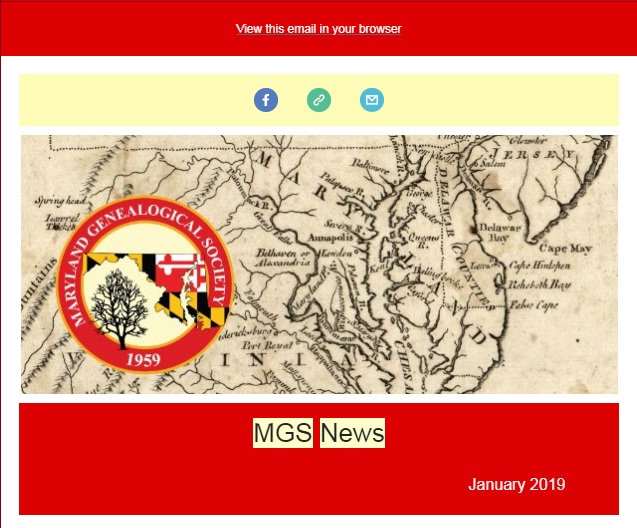
The October 2024 edition of MGS News is now available. If you are a MGS member, you should have received the issue by email. If you are a member and haven't provided us with your email, please contact us at info@mdgensoc.org so that you can begin to receive MGS News.
Archived copies of this issue and previous issues are available in the Member's Only area.
All Issues of the MGS Journal Online
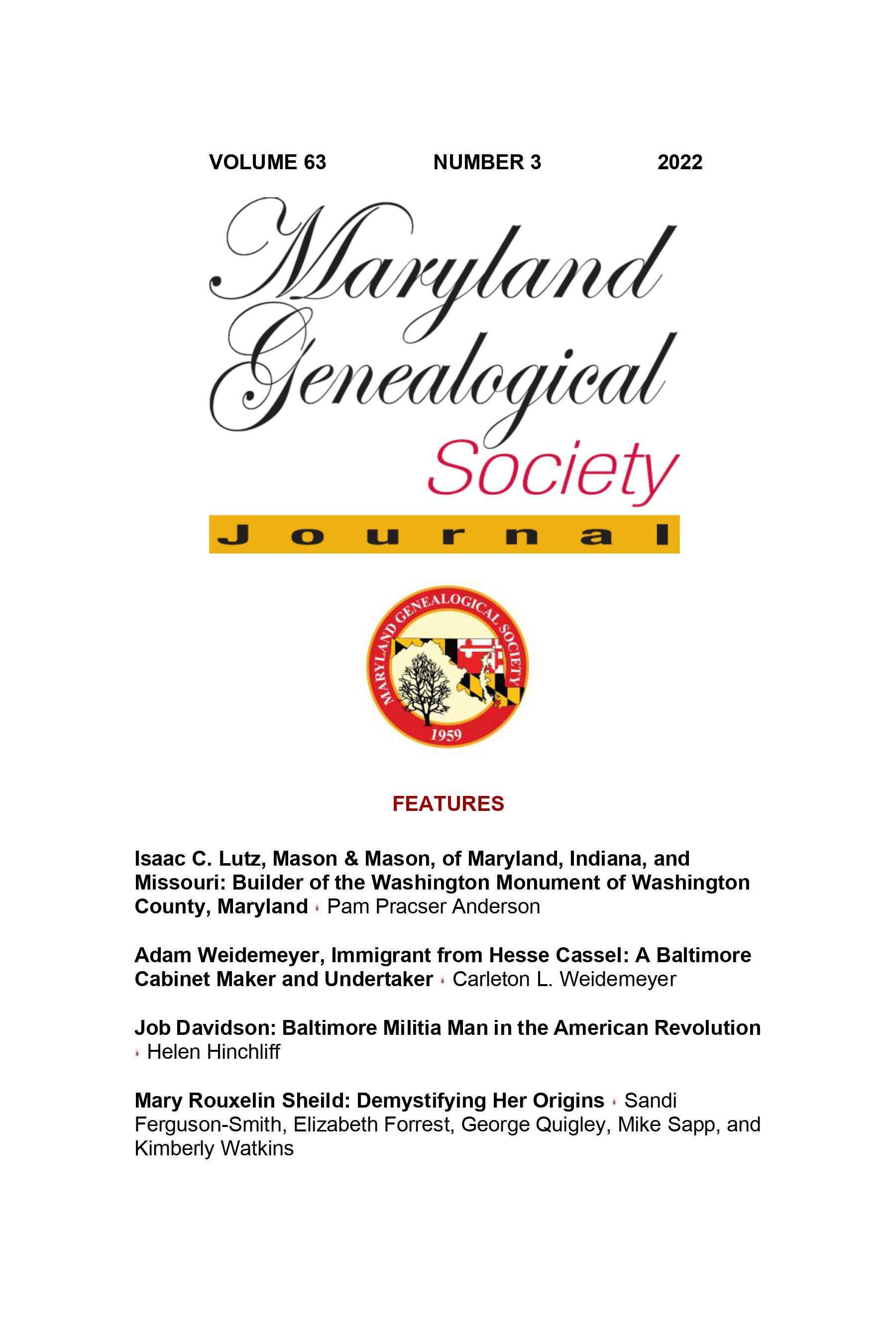 All issues of the Maryland Genealogical Society Journal, from 2008 to the present, are available online to MGS members! The Journal’s predecessor publication, the Maryland Genealogical Society Bulletin, already was online, which means that members can access over 60 years of informative articles on Maryland families and genealogical records.
New issues of the Journal will be posted as they are published.
Webpage Spotlight: Online MD Birth Certificates
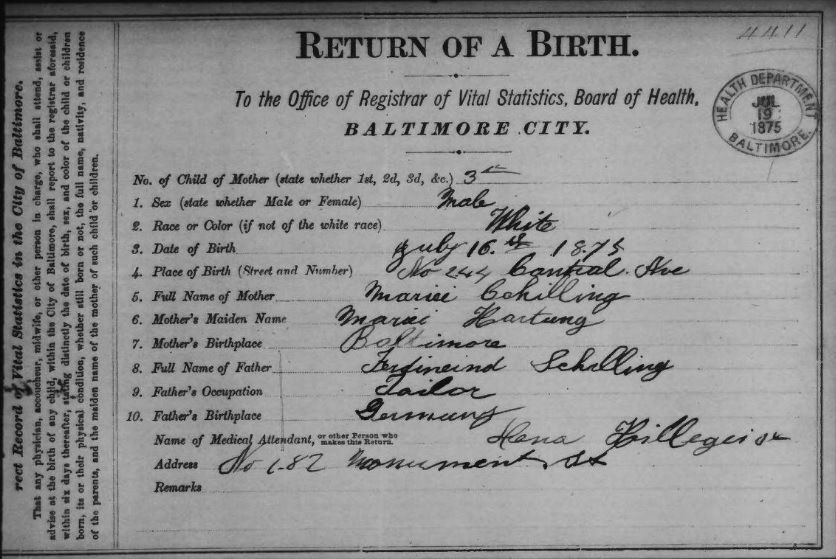 Check out our new webpage on locating Maryland birth certificates online. Starting in 1875 in Baltimore City and in 1898 in the counties, birth certificates that are at least 100 years old are available on the Maryland State Archives website and the Internet Archive website. We've pulled together on one webpage the key links you'll need and tips for successful searching.
MGS Journal
In the most recent issue of the Journal, Ed Funk, who previously wrote about the dramatic and tragic story of his ancestor, Johannes Ziemer, now brings us another in-depth look at one of his forebears, Jakob Conrad Funk. The story takes place in the Federal Hill area of Baltimore, where the immigrant Jacob Funk and his family planted a garden that supplied the family as well as the neighborhood with fruits and vegetables. But trouble began when Thomas Chappell opened a fertilizer plant on an adjacent property. The fumes and fallout from the plant meant the end of the garden, and thus began a lengthy court battle between the two men. This may be one of our earliest documented cases of environmentalism versus industrialization.
In an article that clears up some misinformation, Dann Norton uses court records to distinguish between two Green families, one in St. Mary’s County and one in Charles County. He concludes that there were two Mary Greens and two Sarah Greens living at the same time. Vanessa Wood has tackled an equally confusing family in her article about Green Halsey of South Carolina and his descendants, who eventually moved to Maryland for better economic opportunities. Green was enslaved, but his son Solomon lived as a free man in South Carolina and later in Baltimore, and the family forged strong bonds and thrived in their new home. Dave Powell brings us the interesting but tragic story of his ancestor, David Bonsack. Using a family bible, court records, and newspaper accounts, the author relates that David’s mother left her husband and had an affair with one of his employees, which resulted in David’s birth. David served in the army in the Civil War, married, and became a minister, but he later ran off with one his parishioners—and a good sum of money. Sadly, there is no happy ending here. Finally, John Sinks describes two sets of records in the Montgomery County Court recorded in March 1778 that have been widely overlooked: returns of oaths of fidelity followed by the enumeration of free men over 18, commonly known as the 1778 Maryland Census. As always, we keep you informed about new genealogy publications with Allender Sybert’s reviews.
Used Genealogy Books For Sale
 MGS has an inventory of used genealogy-related books available for purchase on the For Sale page. MGS members receive a 12% discount on purchases. (Be sure to be signed in on the website as a member before ordering!) All prices already include shipping and handling. Sales are first come, first served!
In addition to books on Maryland, our current inventory includes the following topics: family histories; U.S., British, German, New England, New York, New Jersey, Pennsylvania, Virginia, and West Virginia research; photography, lineage societies, royalty and nobility, heraldry, and general interest. We will be adding books as they become available.
|
|

